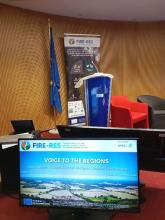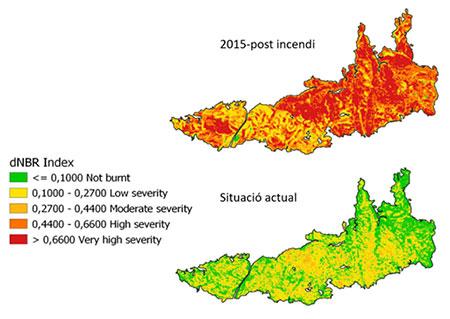The ICGC in the FIRE_RES project: more resilient territories in forest fires

The Cartographic and Geological Institute of Catalonia (ICGC) has participated in the Strategic Dialogue with the European Parliament of the Green Deal project FIRE_RES: more resilient territories to forest fires, held in Brussels on 4 and 5 November.
Leadership in Innovation Actions (I.A.)
Within the framework of the FIRE_RES (Innovative technologies & socio-ecological-economic solutions for fire resilient territories in Europe), the ICGC has played a prominent role as leader of the Innovation Actions (I.A.):
- I.A. 2.1, focused on improving data acquisition for landscape design with new remote sensing methods.
- I.A. 5.3, focused on advanced vegetation characterization through fusion of Earth observation data and Artificial Intelligence in forest ecosystems.

The Normalized Burned Area (NBR) index is an index designed to highlight burned areas in large fire zones.
This leadership has translated into the generation of skills and new geoinformation oriented towards the knowledge of the recovery of post-fire areas, the state and evolution of protection strips, the trafficability of extinguishing routes for fire brigades and the evaluation of models for determining fuel in forest masses.
Strategic vision and conclusions
Among the most relevant conclusions of the day, the need for a coordinated and integrated vision of prevention and extinguishing tasks among all agents in the territory was highlighted, with special attention to regional coordination.
Given the potential increase in large fires due to climate change, emphasis was placed on the search for incentives (economic, social and environmental) that benefit prevention. This vision of the future and the necessary transfer of knowledge between actors inevitably involve the active management of land cover and uses with the involvement of the rural world, as an indispensable condition for enhancing territorial resilience and reducing the impacts of forest fires.